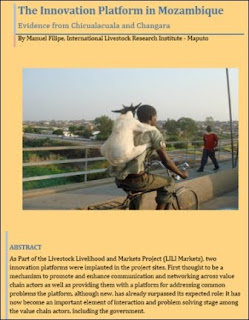| Group discussions at the imGoats project learning and reflection workshop, Udaipur, India, 2-6 July 2012 (photo credit: ILRI/Tezira Lore). |
The imGoats project seeks to investigate how best goat value chains can be used to increase food security and reduce poverty among smallholders in semi-arid regions in India and Mozambique.
On 2-6 July 2012, the project teams from both countries met in Udaipur, India to take part in a learning and reflection workshop on the activities achieved so far and the work still remaining.
The five-day, intensive workshop gave the participants ample opportunity to discuss and share progress achieved by the teams in Rajasthan and Jharkhand in India and Vilanculos in Mozambique in order to learn from each other's experiences in using Outcome Mapping and innovation platforms to improve the functioning of goat value chains.
In addition, the teams were able to review their communication plans and refine their strategies towards identifying the communication outputs to be produced and activities to be undertaken in the final six months of the project.
"The agenda of the workshop was very dense but it is heartening to see that all the teams have made good progress. Outcome Mapping has helped us to adapt our planning and improve our work. The session on innovation platforms was useful for sharing experiences and frustrations, too, and how to overcome these," said imGoats project coordinator Saskia Hendrickx of the International Livestock Research Institute (ILRI) at the close of the workshop.
"We have six months left and a lot to do but there is a good team spirit and we can make it," Hendrickx added.
For more information about the workshop, check out the session notes on the imGoats wiki or read some reflections by ILRI postdoctoral scientists Birgit Boogard and Ramkumar Bendapudi on their experiences with the use of Outcome Mapping and innovation platforms in India and Mozambique. Also check out the workshop photos on Flickr.
Funded by the European Commission - International Fund for Agricultural Research (IFAD), the imGoats project is led by researchers from ILRI in collaboration with the BAIF Development Research Foundation in India and CARE International in Mozambique. For more information, visit imgoats.org.
On 2-6 July 2012, the project teams from both countries met in Udaipur, India to take part in a learning and reflection workshop on the activities achieved so far and the work still remaining.
The five-day, intensive workshop gave the participants ample opportunity to discuss and share progress achieved by the teams in Rajasthan and Jharkhand in India and Vilanculos in Mozambique in order to learn from each other's experiences in using Outcome Mapping and innovation platforms to improve the functioning of goat value chains.
In addition, the teams were able to review their communication plans and refine their strategies towards identifying the communication outputs to be produced and activities to be undertaken in the final six months of the project.
"The agenda of the workshop was very dense but it is heartening to see that all the teams have made good progress. Outcome Mapping has helped us to adapt our planning and improve our work. The session on innovation platforms was useful for sharing experiences and frustrations, too, and how to overcome these," said imGoats project coordinator Saskia Hendrickx of the International Livestock Research Institute (ILRI) at the close of the workshop.
"We have six months left and a lot to do but there is a good team spirit and we can make it," Hendrickx added.
For more information about the workshop, check out the session notes on the imGoats wiki or read some reflections by ILRI postdoctoral scientists Birgit Boogard and Ramkumar Bendapudi on their experiences with the use of Outcome Mapping and innovation platforms in India and Mozambique. Also check out the workshop photos on Flickr.
Funded by the European Commission - International Fund for Agricultural Research (IFAD), the imGoats project is led by researchers from ILRI in collaboration with the BAIF Development Research Foundation in India and CARE International in Mozambique. For more information, visit imgoats.org.




